
Virus-Hit Wuhan Speeds up Diagnosis of Patients
、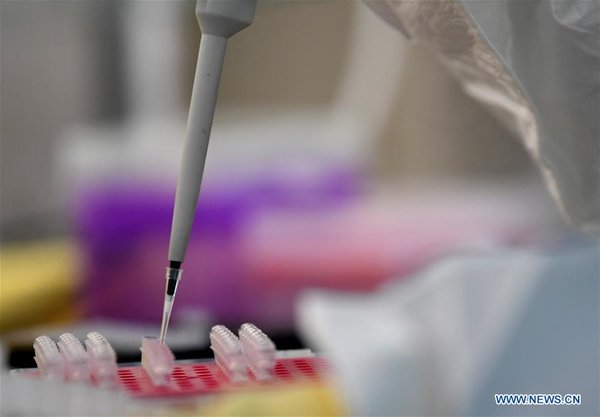
A researcher works at a laboratory of the disease prevention and control center in Nanyang, central China's Henan Province, February 4, 2020. [Xinhua/Hao Yuan]
WUHAN, February 6 (Xinhua) — As more hospitals and qualified third-party institutions join in, Wuhan, the epicenter of the novel coronavirus outbreak, is now able to test nearly 4,200 nucleic acid samples per day, local authorities said.
Apart from provincial and municipal centers for disease control and prevention, 25 hospitals and 12 qualified third-party institutions are also able to conduct nucleic acid testing, according to the Hubei Provincial Health Commission.
As of Monday, the novel coronavirus nucleic acid testing capability of Wuhan had been increased to 4,196 samples per day from the initial 200 samples.
Computed tomography (CT) imaging has also been added as an auxiliary testing method in Hubei, according to the latest diagnosis and treatment plan by the National Health Commission released Wednesday.
This suggests that the diagnosis of the novel coronavirus in the province will no longer be solely dependent on nucleic acid test results.
"The nucleic acid test result is the gold standard for the final diagnosis of novel coronavirus infections, but those who have a negative nucleic acid test result may see positive CT imaging results," said Zhang Xiaochun with the Zhongnan Hospital of Wuhan University.
It takes us time to learn about the novel coronavirus as well as testing and treatment for the disease, she said, adding that the method may help ease the difficulty in conducting nucleic acid tests in a short period of time, helping control the epidemic.
"CT imaging is more convenient and accessible in primary hospitals. It will help reduce cross-infection, controlling the infection source and cutting off the transmission route because the patients, as soon as they are diagnosed, will be put under medical observation and receive necessary treatment," she said.
More hospital beds are also made available as the city is racing against time to turn public facilities into makeshift hospitals.
The first such hospital converted from an exhibition center began accepting patients Wednesday. The hospital can provide about 1,600 beds to infected patients.
Two other public facilities have also been turned into hospitals, with a total of 2,800 beds. They started to take in patients with mild symptoms late Wednesday.
As of Wednesday, a total of 10,117 confirmed cases of the novel coronavirus infection had been reported in Wuhan.
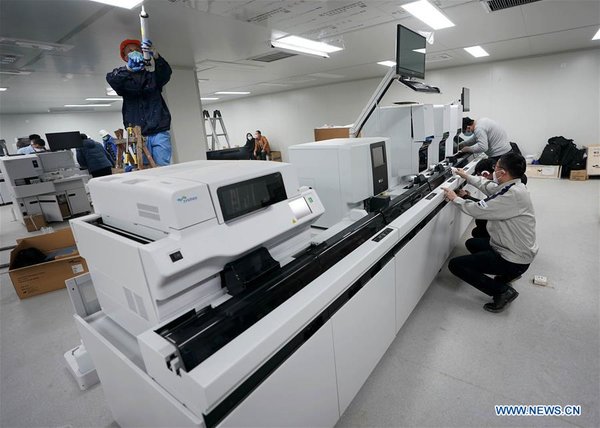
Technicians test the hematology analyzer at the Leishenshan (Thunder God Mountain) Hospital in Wuhan, central China's Hubei Province, February 5, 2020. [Xinhua/Wang Yuguo]
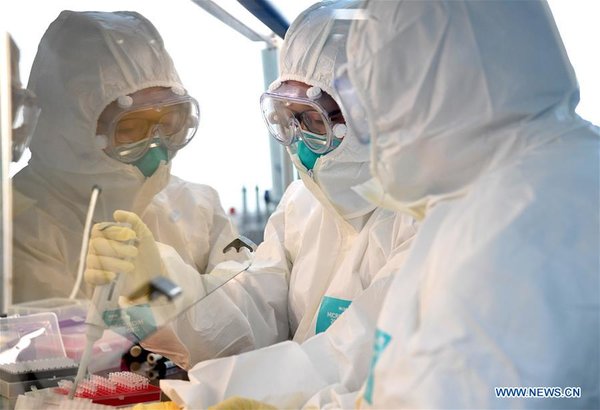
Researchers work at a laboratory of the disease prevention and control center in Nanyang, central China's Henan Province, February 4, 2020. [Xinhua/Hao Yuan]
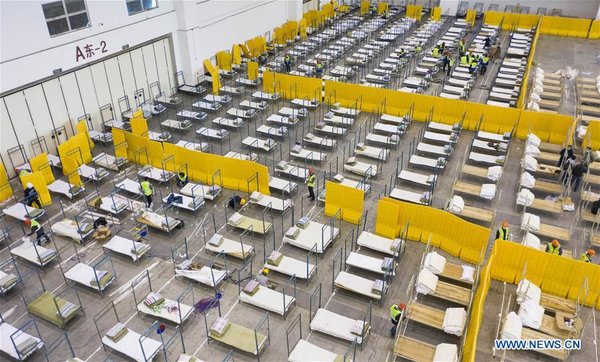
Aerial photo taken on February 4, 2020 shows the interior of "Wuhan Livingroom," which is converted into a hospital to receive patients infected with the novel coronavirus, in Wuhan, central China's Hubei Province. [Xinhua/Cai Yang]
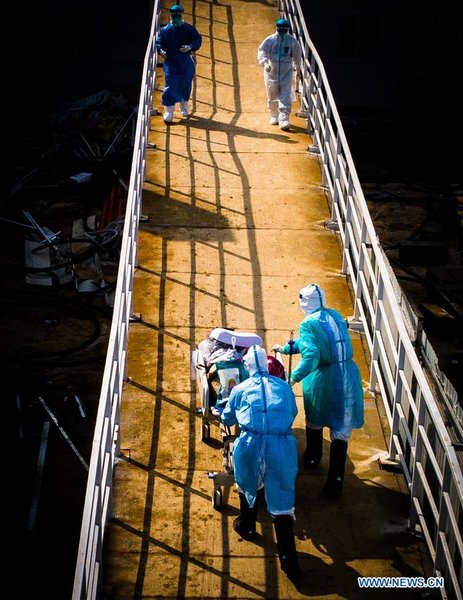
Medical workers help the first batch of patients infected with the novel coronavirus move into their isolation wards at Huoshenshan (Fire God Mountain) Hospital in Wuhan, central China's Hubei Province, February 4, 2020. [Xinhua/Xiao Yijiu]
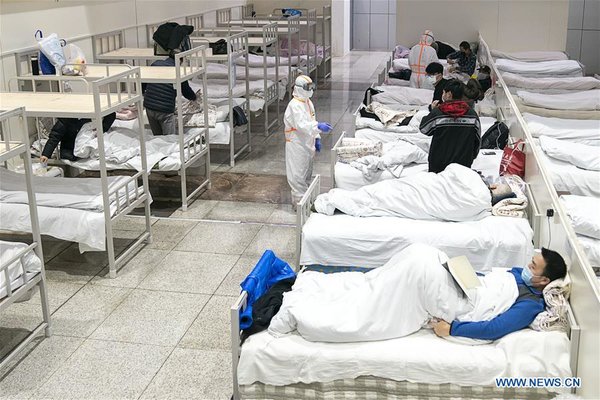
Patients infected with the novel coronavirus are seen at a makeshift hospital converted from an exhibition center in Wuhan, central China's Hubei Province, February 5, 2020. [Xinhua/Xiong Qi]
(Source: Xinhua)
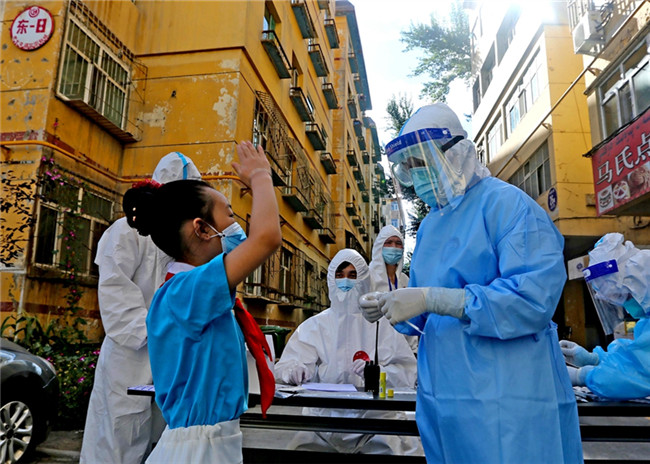 Women Medics in NW China's Xinjiang Contribute to COVID-19 Epidemic Containment
Women Medics in NW China's Xinjiang Contribute to COVID-19 Epidemic Containment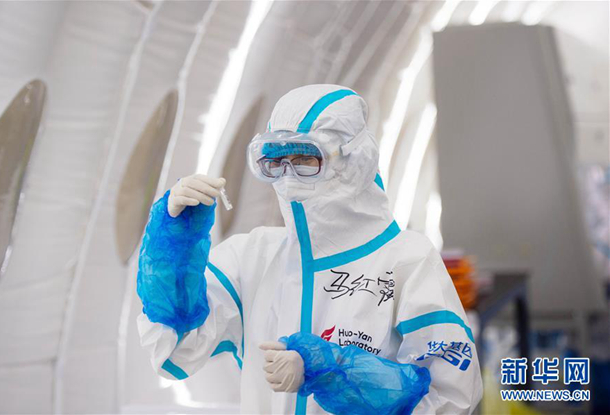 Women CPC Members on Front Line of Anti-COVID-19 Battle in Beijing
Women CPC Members on Front Line of Anti-COVID-19 Battle in Beijing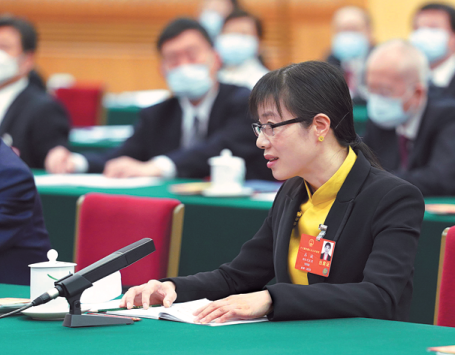 Deputy Recalls Role in COVID-19 Fight
Deputy Recalls Role in COVID-19 Fight- Woman Epidemiological Researchers Race Against the Clock on Front Line
 Pic Story of Nurse Who Aided COVID-19 Fight in Wuhan
Pic Story of Nurse Who Aided COVID-19 Fight in Wuhan Volunteer Provides Milk Tea, Back up Anti-Epidemic Workers in NE China
Volunteer Provides Milk Tea, Back up Anti-Epidemic Workers in NE China

 京公网安备 11010102004314号
京公网安备 11010102004314号